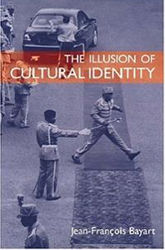 “While British colonial administrators fabricated ‘Indianness’, Hindu intellectuals were formulating Hinduness by resorting to ‘strategic syncretism’. According to Christophe Jaffrelot, this involved ‘structuring one’s identity in opposition to the Other by assimilating the latter’s prestigious and efficacious cultural characteristics’: ‘The appearance of an exogenous threat awakened in the Hindu majority a feeling of vulnerability, and even an inferiority complex, that justified a reform of Hinduism borrowing from the aggressor its strong points, under the cover of a return to the sources of a prestigious Vedic Golden Age that was largely reinvented but whose “xenology” remained active’.*… In short, the reinterpretation of India’s ‘Hindu’ past by the nationalists and their instrumentalisation of ‘tradition’ for militant political purposes have for nearly a century sustained a political identity unprecedented in the cultural landscape of the sub-continent, by incorporating foreign representations into Hinduism — e.g., egalitarian individualism, proselytisation, ecclesiastical structures — and by seeking to ‘homogenise in order to create a nation, a society that is characterised by extreme differentiation’.** On the Indian political chessboard, the celebration of a golden Vedic age is a mere fig-leaf concealing modernity, like the versions of African ‘authenticity’ that developed in the wake of the colonial invention of tradition…” (37-38)
“While British colonial administrators fabricated ‘Indianness’, Hindu intellectuals were formulating Hinduness by resorting to ‘strategic syncretism’. According to Christophe Jaffrelot, this involved ‘structuring one’s identity in opposition to the Other by assimilating the latter’s prestigious and efficacious cultural characteristics’: ‘The appearance of an exogenous threat awakened in the Hindu majority a feeling of vulnerability, and even an inferiority complex, that justified a reform of Hinduism borrowing from the aggressor its strong points, under the cover of a return to the sources of a prestigious Vedic Golden Age that was largely reinvented but whose “xenology” remained active’.*… In short, the reinterpretation of India’s ‘Hindu’ past by the nationalists and their instrumentalisation of ‘tradition’ for militant political purposes have for nearly a century sustained a political identity unprecedented in the cultural landscape of the sub-continent, by incorporating foreign representations into Hinduism — e.g., egalitarian individualism, proselytisation, ecclesiastical structures — and by seeking to ‘homogenise in order to create a nation, a society that is characterised by extreme differentiation’.** On the Indian political chessboard, the celebration of a golden Vedic age is a mere fig-leaf concealing modernity, like the versions of African ‘authenticity’ that developed in the wake of the colonial invention of tradition…” (37-38)
* Christophe Jaffrelot, Les Nationalistes hindous (Paris: Presses de la Foundation Nationale des Sciences Politiques, 1993, p. 24, 41).
** Ibid., 83-4.
[This is one of an ongoing series of posts, quoting from Bayart’s The Illusion of Cultural Identity, that further documents the theoretical basis
on which Culture on the Edge is working.]


 “While British colonial administrators fabricated ‘Indianness’, Hindu intellectuals were formulating Hinduness by resorting to ‘strategic syncretism’. According to
“While British colonial administrators fabricated ‘Indianness’, Hindu intellectuals were formulating Hinduness by resorting to ‘strategic syncretism’. According to